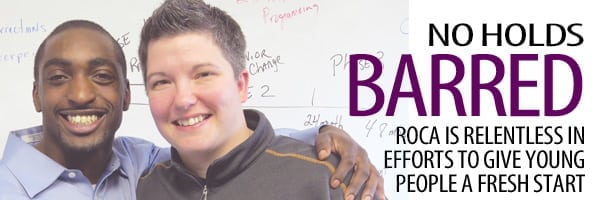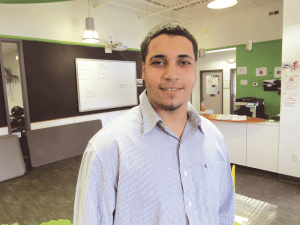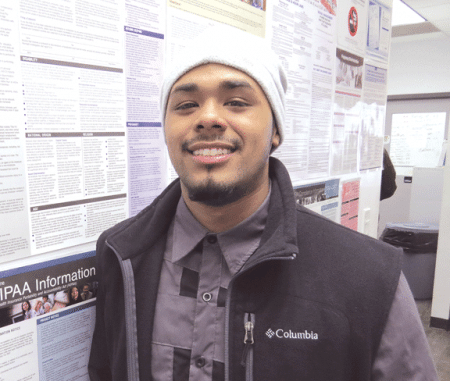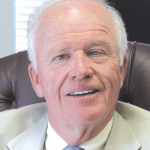
No Holds Barred
Roca Is Relentless in Efforts to Give Young People a Fresh Start

Christine Judd, director of Roca’s Springfield facility, with Kadeem Batchelor, one of the “young people” now in phase 1 of the agency’s intense intervention program.
David Rios says that, in the weeks and months after he entered the Roca program in Springfield last summer, “the street,” as he called it, kept trying to lure him back to a lifestyle that eventually landed him in the Hampden County Correctional Facility in Ludlow, and he was often tempted — very tempted.
And it’s easy to see why.
Indeed, the money he could make selling drugs was almost exponentially higher than what he earned shoveling snow, clearing fire hydrants, mowing lawns, and cleaning alleyways in downtown Holyoke — just some of the many assignments parceled out as part of Roca’s transitional employment efforts.
But what kept him from returning to the streets was something far more important — and powerful — than money.
“I’m the father of six now, and I saw myself either looking at them through glass and explaining to them why I was there, or being out with them,” he told BusinessWest. “I put my mind in a place where I wanted to be home and be able to see my kids and hug my kids.”
Helping all the “young people” — that’s the term this organization uses in reference to those it works with — who come through the doors find such a place is the unofficial mission statement for Roca, which was founded in Chelsea in 1988 and expanded into Springfield in 2010 and later into Boston.
The official mission is to “disrupt the cycle of incarceration and poverty by helping young people transform their lives,” and it carries out this mission through a four-year program that all those involved, from Christine Judd, director of the Springfield facility, to Hampden County Sheriff Michael Ashe, to people like Rios, described with the word intense.“And it needs to be because of the people we’re working with,” said Judd, noting that Roca — which translates into ‘rock’ in Spanish — was designed specifically for individuals (in Springfield, males ages 17-24) who are seriously at risk, meaning they’ve been incarcerated, have no real work history, dropped out of school, and usually needed to be dragged into this program kicking and screaming.
She calls them “Roca kids.”
Ashe, sheriff for more than 40 years now, needed a few more words to describe this constituency. “In every urban area in America today, there is a population of young people who are over a cliff,” he said. “And what we’re trying to do is set up a safety net at the bottom. Roca is that net; no other nonprofit, no other education center has been able to connect with this population and get them to consider changing their ways.”

David Rios says he found it tempting to return to the street, but he’s been steeled by a desire not to view his children through the glass wall of a prison visiting center.
A year into the unique PFS initiative, Roca is hitting its numbers and actually exceeding them, said Lili Elkins, the agency’s chief strategy officer, noting that, of the young men retained in Roca’s model 24 months or longer, 92% had no new arrests, 98% had no new technical violations, and 89% retained employment for at least 90 days.
While still in its relative infancy, at least when compared with the facility in Chelsea, Roca Springfield is making major contributions to that success record. Last December, the operation honored its first ‘graduates,’ those who had successfully completed the four-year program and moved on to permanent employment.
Trevor Gayle was one of them.
He’s now a full-time employee of Chase Management, a Springfield-based property-management company for which he handles a variety of duties ranging from painting to maintenance to apartment-turnover work. He has his own place now and has been able to put the street in his rear-view mirror.
When asked if he thought such a fate was possible when he came to Roca, somewhat reluctantly, in the summer of 2011 — after spending six months in jail for sitting in the seat next to a friend who shot and wounded an individual as he approached their vehicle — he paused a minute and shook his head.
“No … I never thought I’d be here,” he said as he sat at what amounts to the conference room at Chase’s office, explaining that he didn’t find Roca — it found him. “Every day, I think about how many times I could have been put away or put in the dirt, just because of me hanging out there. I’m really lucky.”
For this issue, BusinessWest takes an in-depth look at Roca and how it manages to help people Gayle turn their lives around, stay out of prison, and beat the street.
Coming to Terms
Kadeem Batchelor said that, when he first arrived at Roca six months ago after spending four years at the Ludlow jail for “being young and following,” which translates into drug and gun crimes, he didn’t get the concept, or big picture, as he put it.
Suffice it to say, he gets it now.
“I was used to everything happening overnight,” he said. “Once I realized the concept that things don’t happen overnight, and once I calmed down and started listening, my outlook changed. Before I came here, I was ignorant and didn’t care; I’m much more mature now. Here, they show you how to face reality, stand up to your problems, just be a man about your situation and not try to take the easy way out.”
Such an attitudinal change is what Molly Baldwin had in mind when she founded Roca in 1988. The concept, as summed up in the marketing slogan ‘less jail, more future,’ was simple — use street outreach, data-driven case management, stage-based education, and employment training to reduce individuals’ involvement in crime, keep them out of jail, and help them get jobs.
Carrying out that mission has been anything but simple, but Roca has succeeded through partnerships — with constituencies ranging from law-enforcement officials to private business owners — that essentially involve the entire community in the work to keep young people on a path to success. “We’ve always operated with the attitude that everyone matters in life,” Baldwin told BusinessWest. “Today, many young people are having a lot of difficulties, but they, too, can make the changes to turn their lives around, and it’s a privilege to do this work.”
Roca’s success in Chelsea eventually caught the attention of Ashe, who, over the years, had created or adopted a number of programs to transition individuals from incarceration to the workforce, but needed a program that specifically focused on that ultra-high-risk constituency, which, as he said, was over a cliff, and possessed the requisite intensity to achieve results.
“We really liked the model,” he explained. “There is a relentless pursuit, or unyielding pursuit, of these people, and we knew that it took this kind of intensity, this kind of focus, to get young people away from a pursuit of drugs, violence, and gangs. Roca had the passion, the commitment, and the dedication to connect with this population.”
From the beginning, all those who became involved locally, at Ashe’s behest, understood the agency’s importance, its mission, and the many challenges to carrying it out.
Frank Fitzgerald, principal with Fitzgerald Attorneys at Law and a member of the original advisory board for Roca Springfield, said the City of Homes — like other major urban centers — has changed considerably since he grew up there.
“When I was a kid, we’d hang out on the corner; the cruiser would pull up, and the officer would crook a finger at us and put us in the back seat,” he recalled. “We’d say, ‘I didn’t do anything,’ and they’d say, ‘it’s not what you did, it’s what you’re thinking about doing.’ We’d be driven home to our parents, and the activities for the evening would be substantially curtailed.
“Today, in our core cities, it’s not like that — it’s serious crime,” he went on. “And this [Roca] is what we need; we need people out bringing these guys in, putting them through the program, and putting them to work. The economic benefit of someone who’s productive in society, as opposed to someone in jail, at the taxpayer’s expense, is huge.”

Trevor Gayle, a recent graduate of Roca, is now a full-time employee of Chase Management Service, whose owner, Sheryl Chase, saw an opportunity to help young men in the program.
Beyond these characteristics, many of the participants didn’t want anything to do with Roca — initially, at least — and that’s the way the agency wants it.
“If you want to be in, we don’t want you,” said Elkins, as she talked about all three Roca operations. “We’re an interesting program because we are truly focused on the highest-risk young men and the ones who are not able to engage in traditional programming. We joke with people and say, ‘if you’re able to show up for programming on your own, without us needing to harass you and drag you in, we’ll send you somewhere else because you’re too high-functioning, and you don’t need our services.’”
Judd agreed. “If you’re high-risk enough, and I’ve had a conversation with you and I deem you a Roca kid, we own you,” she said. “At which point, we’re relentless and we’ll stay on you, whether you want us to or not. Our outreach workers are constantly knocking on doors, and sometimes they’re slammed in their face; it’s a four-year program, and for that first six months, it’s about being relentless and building that relationship of trust.”
The Springfield program began with 50 such individuals and a staff of three. Things got started in a few rooms donated to the cause by Ashe, and the operation later moved into a small building on School Street. Its first day there, a tornado roared through the South End, just a few blocks away.
Since then, Roca has been an equally powerful force.
Work in Progress
Judd said the agency’s four-year program has three phases: the first six months (and there’s actually a phase within that phase); months six through 24, when transitional employment initiatives take place; and then the final two years, when the young people move on to outside placement with a number of area employers, including Beacon Management, Lenox American Saw, F.L. Roberts, Steven A. Roberts Landscape Architecture & Construction, and others.
Actually, work sometimes begins while someone is still incarcerated, so that when they reach Roca’s door, they know what the program is about and can, in some ways, hit the ground running, she explainedJudd added that, through that pay-for-success initiative, referrals come to Roca from probation departments, parole offices, the Department of Corrections, and the Department of Youth Services.
“We’ll go behind the wall in those facilities to meet with those young people and build those relationships before they get out,” she explained. “When they get out, we find their address, and we maintain contact; our whole goal is to get them into our building, and when they’re here, it’s very rare that they walk out without some sense of camaraderie, a sense of belonging, or a sense of family.”
Gayle recalls that he hadn’t been out of jail long after that shooting episode before those at Roca started looking for him. Actually, they went to his younger brother first, hoping he might be an intermediary and convince him to take part. Those plans didn’t go according to the script.

Christian Vasquez, who arrived at Roca last summer, is working toward his GED and driver’s license, and possesses what he called a “new attitude.”
But he admitted that it was difficult in the beginning. Indeed, like Rios, he said the street kept beckoning, and it was hard not to listen. Meanwhile, he didn’t take to the Roca way quickly or easily.
“In the early stages, I was being real belligerent, and they were telling me stuff that I couldn’t do, and I was upset because I couldn’t do it,” he recalled. “I was still in that phase where, if you tell me not to do something, I’m still going to do it anyway.”
Judd said such struggles are commonplace, and, as she talked about phase 1 of the program, she drew a comparison to the TV show The Biggest Loser and the beginning of those contestants’ experiences.
“That’s when you see the biggest behavioral change,” she explained. “The first time a young man walks into our door, his pants are down around his knees, he’s got his colors on, he’s representing his set. And his language and decorum are way off — he doesn’t look you in the eye, there’s no handshake … that’s the first 60 days.”
Transition Game
By the time those two months are over, there is usually recognizable change, she said, adding that the first phase of the program is dedicated to assessing an individual, achieving some measure of buy-in, and building the relationships and trust that will certainly be needed to get through phases 2 and 3.
The former involves transitional employment, she noted, adding that this takes place between months six and 24 and involves work four days a week for a host of employers, including the cities of Springfield, Holyoke, and Chicopee, as well as a few property-management companies, including Chase. The fifth day, Wednesday, is “development day,” said Judd, during which the young people work on everything from financial literacy to mock interviews to what she called “fatherhood class.”
The move from phase 2 to phase 3 equates to shifting from basic training to advanced programming, said Judd, adding that those who make this transition — and some make it more easily than others — become essentially temporary employees for several area companies, including the property-management businesses, F.L. Roberts, Lenox American Saw, and others.
“They either have a job or they’re still looking for a job, or whatever, but we’re working hard over the next two years to get them placed, get them in housing, or get them in school,” she explained. “This is where we say, ‘it’s time to put your big-boy pants on and do it. You still have our support; however, it’s time to grow up.’”
For phases 2 and 3 to meet their missions, and for participants to move on to graduation and permanent employment, Roca needs partners in the form of area employers willing to step forward and assist this still-high-risk demographic, Judd said.
Sheryl Chase became one willingly because she recognized the need, had some opportunities to help, and saw a responsibility to assist a constituency that many would prefer to ignore or designate as someone else’s problem.
“Roca is a great program, and its work is really important to the community,” said Chase, who now has a diverse portfolio that includes everything from single-family homes to a 50-unit apartment complex and manages 10 full-time employees.
She first became involved with the transitional-employment phase of the Roca program, using participants to help clear properties of the heavy snows last winter, before taking things to a higher level by hiring two men, one of them Gayle, full time.
The other hire didn’t work out, she said, an indication of how difficult it is for some to make the transition from the street to the workforce. “It’s tough going from making $1,000 a week selling drugs to making $12 an hour busting your butt; it’s a whole different mentality, and you have to answer to people in ways you’ve never had to answer to them before.”
Gayle is faring much better with the transition, said Chase, adding that the company is being supportive in any way it can. Indeed, while employees are required to have cars so they can get from site to site easily, that policy has been waived for Gayle, who either works with a partner or stays at one site all day.
“We understand the challenges he’s facing,” said Chase, “and are trying to help him succeed.”
Street Smarts
What Roca has been able to provide for both graduates and those still involved in its various phases is a sense of hope that they can leave the street behind and find something better, if not inherently more lucrative financially. It’s also provided both a desire to set goals and an attitude that they can, indeed, be met.
Gayle, 24, soon to be 25, calls them “power moves,” or big steps toward being successful in life. Getting a job was simply the first, he said, adding that he wants to eventually go back to school, become a great father to his son, own a home, and, most importantly, become a role model for his child.
“I feel like, if I can change everything around now, then when he gets older, when he starts acting up, because every kid goes through it … when he sees that and he sees how his father did it, he can definitely follow suit and do the same thing.”
As for Rios, he has three and half years to go before he graduates, but already he sees significant light at the of the tunnel.
“I see myself doing good; I see a lot of doors opening that I couldn’t imagine opening for me,” he said. “I’ve learned a lot, including stuff I didn’t even know that I could do.”
Christian Vasquez, like Batchelor, Gayle, and most others, was hard-headed when he arrived at Roca last summer after a short stint in prison that was nonetheless long enough to make him pledge never to go back.
But his stance eventually softened during that six-month period of transition Judd described. He’s working toward his GED and his driver’s license, is exploring possible paths to a career as a graphic artist, and has developed what he described as a new attitude.
“I’m carrying myself the right way, and I’m looking forward, not back at everything that happened,” he told BusinessWest. “I’ve changed a lot — I’m not the same person I used to be. I’m more calm, and I’m just striving for my goals like I’m supposed to. I’ve got stuff I’m looking forward to.”
Batchelor, meanwhile, is currently enrolled at Springfield Technical Community College, with designs on majoring in business, while also looking toward getting into comedy — he recently did a one-man show at Roca — or acting.
“Whatever you put your dream to, they’re here to support you,” he said of the staff and volunteers at Roca. “They can help you change your life.”
With that, he spoke for everyone who has somehow made it to and through Roca’s door.
George O’Brien can be reached at [email protected]







